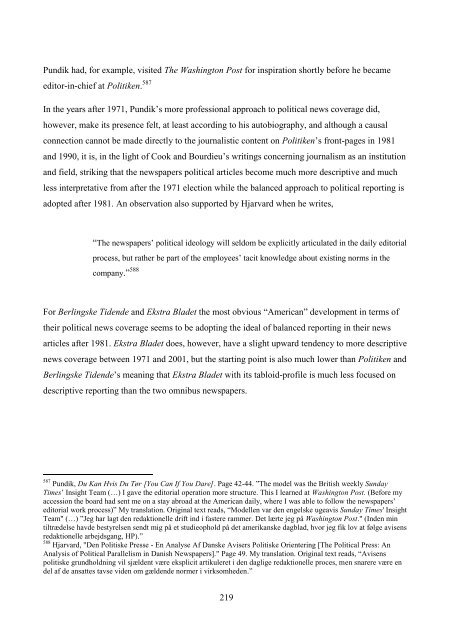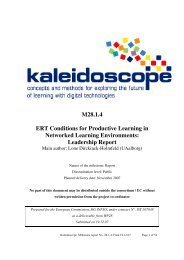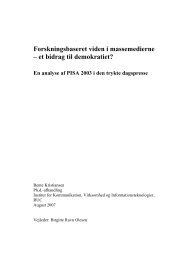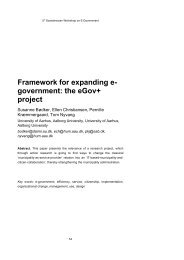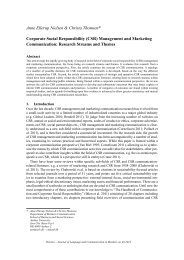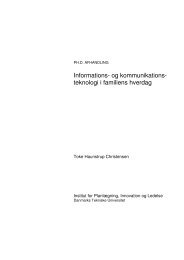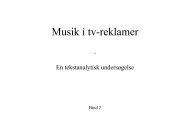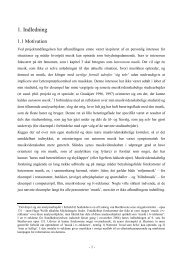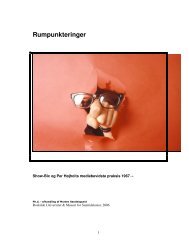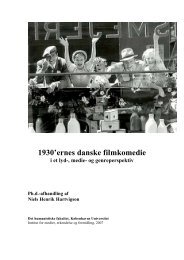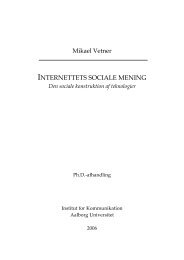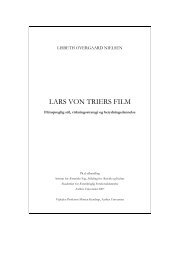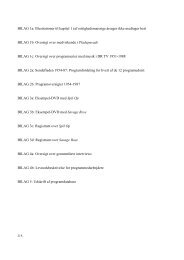The Jeremiad Over Journalism
The Jeremiad Over Journalism
The Jeremiad Over Journalism
You also want an ePaper? Increase the reach of your titles
YUMPU automatically turns print PDFs into web optimized ePapers that Google loves.
Pundik had, for example, visited <strong>The</strong> Washington Post for inspiration shortly before he became<br />
editor-in-chief at Politiken. 587<br />
In the years after 1971, Pundik‘s more professional approach to political news coverage did,<br />
however, make its presence felt, at least according to his autobiography, and although a causal<br />
connection cannot be made directly to the journalistic content on Politiken‘s front-pages in 1981<br />
and 1990, it is, in the light of Cook and Bourdieu‘s writings concerning journalism as an institution<br />
and field, striking that the newspapers political articles become much more descriptive and much<br />
less interpretative from after the 1971 election while the balanced approach to political reporting is<br />
adopted after 1981. An observation also supported by Hjarvard when he writes,<br />
―<strong>The</strong> newspapers‘ political ideology will seldom be explicitly articulated in the daily editorial<br />
process, but rather be part of the employees‘ tacit knowledge about existing norms in the<br />
company.‖ 588<br />
For Berlingske Tidende and Ekstra Bladet the most obvious ―American‖ development in terms of<br />
their political news coverage seems to be adopting the ideal of balanced reporting in their news<br />
articles after 1981. Ekstra Bladet does, however, have a slight upward tendency to more descriptive<br />
news coverage between 1971 and 2001, but the starting point is also much lower than Politiken and<br />
Berlingske Tidende‘s meaning that Ekstra Bladet with its tabloid-profile is much less focused on<br />
descriptive reporting than the two omnibus newspapers.<br />
587 Pundik, Du Kan Hvis Du Tør [You Can If You Dare]. Page 42-44. ‖<strong>The</strong> model was the British weekly Sunday<br />
Times‘ Insight Team (…) I gave the editorial operation more structure. This I learned at Washington Post. (Before my<br />
accession the board had sent me on a stay abroad at the American daily, where I was able to follow the newspapers‘<br />
editorial work process)‖ My translation. Original text reads, ―Modellen var den engelske ugeavis Sunday Times' Insight<br />
Team" (…) ‖Jeg har lagt den redaktionelle drift ind i fastere rammer. Det lærte jeg på Washington Post." (Inden min<br />
tiltrædelse havde bestyrelsen sendt mig på et studieophold på det amerikanske dagblad, hvor jeg fik lov at følge avisens<br />
redaktionelle arbejdsgang, HP).‖<br />
588 Hjarvard, "Den Politiske Presse - En Analyse Af Danske Avisers Politiske Orientering [<strong>The</strong> Political Press: An<br />
Analysis of Political Parallelism in Danish Newspapers]." Page 49. My translation. Original text reads, ―Avisens<br />
politiske grundholdning vil sjældent være eksplicit artikuleret i den daglige redaktionelle proces, men snarere være en<br />
del af de ansattes tavse viden om gældende normer i virksomheden.‖<br />
219


